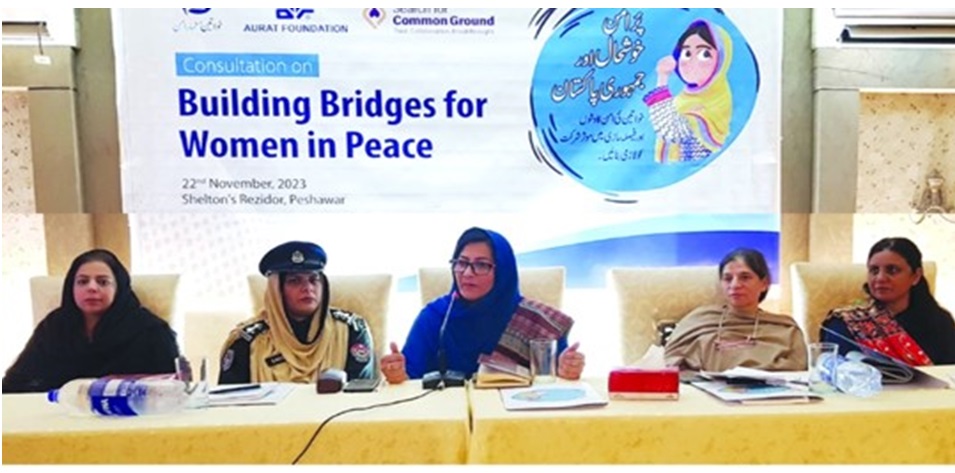
22-11-2023
Peshawar
Empowering Youth to Counter Extremist Content on Digital Platforms
AF organized consultation on Building Bridges for Women in Peace on 22nd Nov. 2023, at Shelton Rezidor Hotel, Peshawar. The speakers were Dr. Faiz Ullah Jan, Chairman, Journalism and Mass Communication Department, University of Peshawar, Ms. Zohra Aslam, Director General, Benazir Income Support Programme, Khyber Pakhtunkhwa, Ms. Amna Durrani, Director Programmes, KP Commission on the Status of Women, Ms. Saeeda Shaheen, Gender Desk Officer, Police Department, Peshawar, Ms. Shabeena Ayaz, Resident Director Aurat Foundation, KP, Ms. Ishrat Batool, Educationist, Women Peace Architects, D.I. Khan and Ms. Samreen Hakeem Advocate, Women Peace Architects, Swat. A total of 81 participants, including 21 males and 60 females, attended the CWG in Islamabad. The event also attended by former local government members, political party representatives, law enforcement agencies, BISP, health and education authorities, human and women’s rights commissions, prominent lawyers, academia, students, media, NGOs, CSOs, experts, and think tanks.
Dr. Faiz Ullah Jan, Chairman, Journalism and Mass Communication Department, University of Peshawar, said that understanding the context of extremism is indeed crucial for addressing issues related to peace and stability in Pakistan, as well as in any other region facing similar challenges. We should need to identify the common factors and drivers of extremism. Without understanding the historical and political context of extremism and terrorism, peace is not possible. He further said that education is a powerful tool to build learners' resilience to violent extremism. It helps strengthen their commitment to non-violence and peace, in particular by addressing hateful and violent narratives.
Ms. Zohra Aslam, Director General, Benazir Income Support Programme, KP shared that women who are economically empowered and have an active role in decision-making processes are less likely to be vulnerable to extremist ideologies. Women are well-connected within their communities. They can act as effective early warning systems, identifying signs of radicalization or potential threats and intervening before individuals become fully involved in extremist activities. She also emphasized that youth can play a significant role in countering extremist content on digital platforms. They can use social media and other online spaces to promote positive narratives and challenge extremist ideologies. There is need to sanitize and train young women and youth in conflict resolution, mediation, and community leadership and common ground approach.
Ms. Amna Durrani, Director Programmes, KP Commission on the Status of Women, said that Commission is playing active role in law and policy making. A number of pro women laws has been passed. She briefly shared about laws and initiatives taken by KP government to protect women and marginalized groups. She said that preventing violent extremism, is a comprehensive approach that aims to address the root causes of violent extremism and prevent individuals from radicalizing toward violence.
Ms. Saeeda Shaheen, Gender Desk Officer, Police Department, Peshawar, said that law enforcement, including the police, plays a critical role in CVE and PVE. She said that to reduce GBV, violence against women and girls and to stop the radicalization process before it leads to violence, there is needed to strengthen the interagency and community coordination mechanisms. She said that collaboration and coordination among various government agencies, departments, civil society, religious leaders, community activists, women leaders, educational institutions and stakeholders involved in PVE efforts can build trust and contribute to early detection and prevention.
Ms. Shabeena Ayaz, Resident Director Aurat Foundation, KP talking about opportunities and spaces for women's inclusion in the implementation of CVE/PVE laws and policies, she said that women should be included in decision-making bodies, task forces, and committees responsible for shaping and implementing CVE/PVE policies. The active engagement of women in the formulation of policies can ensure that the diverse needs and concerns of women are considered.
|

